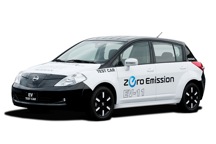Nissan Motor Company has signed a contract with EnerDel and its parent company Ener1, an Indiana company that has been working on advanced lithium-ion automotive batteries.
The research is targeted specifically at developing a new generation of electrical conductive material intended to reduce cost and improve the performance of electric and hybrid vehicle batteries. The company is betting heavily on electric cars after rejecting hybrid technology.
“This project is about continuing the evolution of a critical technology,” said Charles Gassenheimer, CEO and Chairman of EnerDel, parent company Ener1, Inc.
“Nissan is one of the leading companies driving the electric vehicle market today. Over 12 months of discussions on this effort, our management and technical teams have had a tremendous opportunity to get know one another. We are looking forward to successful realization of this project’s important goals.”
EnerDel recently cut the ribbon at one of the most advanced battery production lines for large format cells at its Indianapolis plant. The facility is currently the only high volume manufacturing facility for automotive lithium-ion batteries in the U.S.
Several other companies are also moving forward with plants for building lithium-ion batteries in the U.S., even though tests of the emerging technology remain incomplete. However, tests by GM, Ford and their battery suppliers such as Saft and A123 have bolstered the case for using lithium-ion batteries in both hybrids and pure electric vehicles.
EnerDel and Nissan plan to co-fund research of a new electrolyte, a viscous liquid that serves as the essential conductive material between battery electrodes, at Argonne National Laboratory (ANL) outside Chicago. EnerDel and Argonne recently cooperated on the development of the lithium titanate battery chemistry. The chemistry has already been cited favorably by R&D Magazine, which gave it an award for both excellence in technology and innovative design. “Argonne and EnerDel have been working successfully together for years to advance electric drive in the U.S.,” said Al Sattelberger, the Associate Lab Director of ANL.
“We are pleased to pursue another breakthrough technology working with the leading national lab in the U.S. for transportation and one of the world’s most technologically innovative car companies,” said EnerDel Chief Operating Officer Naoki Ota. “This is an opportunity to make a major new contribution to the future of electric drive in the U.S. and to forge a closer relationship with a major global car maker.”
EnerDel is led by engineers and energy system experts, who are building on proprietary technology originally pioneered at the Argonne National Laboratory.
The company expects to be the first company to mass-produce a cost-competitive lithium-ion battery for hybrid and electric vehicles. In addition to the automobile market, applications for EnerDel lithium-ion battery technology include medical, military, aerospace, electric utility and other growing markets, company official said.
Nissan has promised to launch an electric vehicle in 2010 and earlier this week previewed its electric vehicle platform on a Tiida-based prototype. The production-intent Nissan EV will make its official debut next week.
The dedicated EV platform is comprised of a highly rigid body, high-performance motor, compact lithium-ion battery with high power output and energy capacity, delivering outstanding driving performance and safety, while offering a quiet and peaceful driving experience, a unique feature of a fully-electric drivetrain.
The electric motor, which developed specifically by Nissan for EV applications, delivers 80kW/280Nm for high response and powerful acceleration. Nissan’s unique motor control is also said to contribute to the vehicle’s seamless acceleration.
The 24kWh laminated compact lithium-ion battery pack is placed under the vehicle floor for more efficient packaging, without compromising cabin or cargo space. The battery layout also allows smooth under floor air-flow which helps reduce drag.

